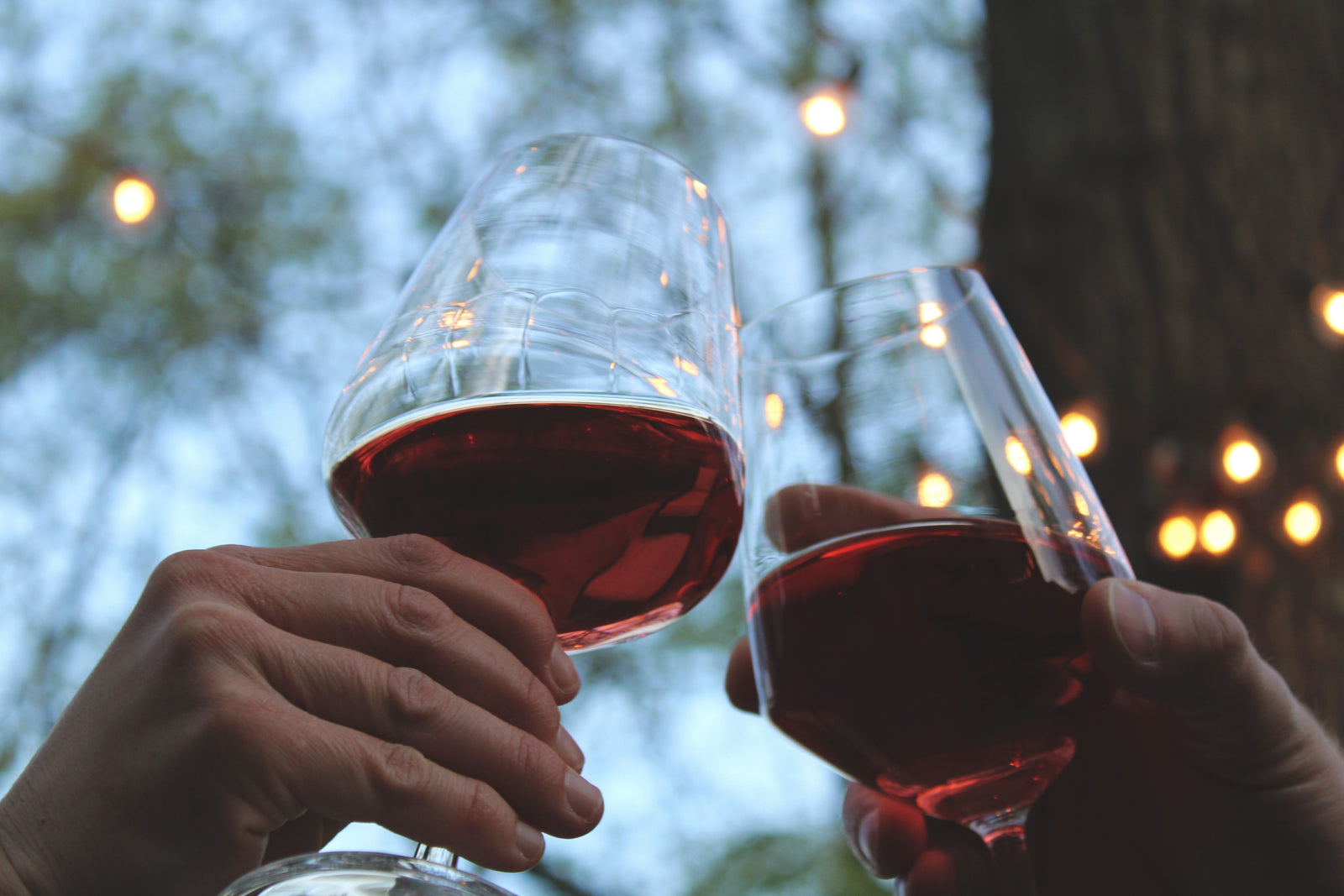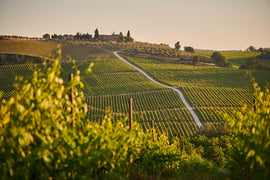60 miles due east of Portland, Oregon lies arguably the most exciting, and quite possibly the most beautiful, wine region in the United States. The Columbia Gorge AVA straddles Oregon and Washington, with wineries and vineyards covering 40 total miles on both sides of the Columbia River, which bisects the Casacade Mountain range and separates the two states. It is one of the most climatically diverse corners of the planet, a visually stunning collision of rainforest, mountain valley and high desert nestled in between Mt. Hood to the south in Oregon and Mt. Adams to the north in Washington. Following the river corridor, foggy cliffs, verdant canopies and majestic waterfalls in the west shift abruptly into the arid and sundrenched high desert plains of the east, losing an inch of annual rainfall per mile. This dramatic variation is caused by rain shadow effect of the Cascades, in which moisture-heavy marine air meeting the Cascade Range cools as it rises and releases its moisture falls in the form of rain or snow. The further east the air moves, the less moisture remains, so annual rainfall averages go from 75+ inches in the west to nine in the east. The result is a protean chain of microclimates boasting complex soil deposits of basalt, silt, sedimentary chert, old river rocks and more — the imprint of millions of years of volcanic ferment and the cataclysmic Missoula Floods that sculpted and shaped the area at the end of the last Ice Age. You can grow almost anything here in other words – and people pretty much do. There are some 40 different varietals, everything from Arneis to Lemburger to Zinfandel, currently under vine in the Columbia Gorge AVA.
If, like us, you were largely ignorant of this nearby oenophilic Eden up till now, the Gorge’s irreducible complexity is likely one reason why. Compared to neighbors in the Willamette and Columbia Valleys, famed for Pinot Noir and Cabernet Sauvignon respectively, Columbia Gorge viticulture is very difficult to summarize. It lacks a style, a signature varietal or a storied history. The immense geological variance - 2,000 ft elevation swings, and not a lot of flatlands - also ensures vineyard holdings are tiny and productions small. So, although wine grapes have been grown in the region since the 19th century (including 152-year-old Zin vines), it wasn’t until the 1970’s that a handful of post-Prohibition pioneers began planting more widely, and the Columbia Gorge AVA wasn’t even established until 2004. Since then, it has become a magnet and epicenter for forward looking growers and vintners; today, there are 50 wineries and 90 vineyards in the area, comprising a close-knit community dedicated to regenerative and biodynamic agriculture, and intent on honoring the idiosyncrasies of the terroir with startlingly fresh and unique wines.
Analemma, so named for the figure 8 shape of the Sun's annual migratory path between the northern and southern hemispheres, was founded by spouses Steven Thompson and Kris Fade in 2010 - making them relative veterans amongst the Gorge’s new wave. Steven’s prior career as a bike tour guide took him all over the world, from New Zealand to Turkey, before 9/11 found him stranded in Europe, where he used the time to work a harvest in Chianti. Hooked, he attended the Enology and Viticulture Program at Walla Walla Community College, and worked at the nearby Cayuse Vineyards after graduation. He met Kris, who had previously worked harvest and studied Applied Organics and Biodynamics in New Zealand, in Cayuse’s tasting room. Following a brief relocation to New Zealand, they were drawn back to the Pacific Northwest by an opportunity to lease Atavus Vineyard, a dry-farmed-since-the-60’s site on the Washington side of the Gorge. Initially planning to produce Pinot Noir, they found the subalpine climate didn’t allow the grape to fully ripen and switched to rose, Gewurtraminer, and even Method Champenoise sparkling wine. Steven and Kris then brought this same experimental rigour to their Mosier Hills Estate site, purchased in 2011, which sits in the shadow of Mount Hood, on the Oregon side of the Gorge. At 600 ft elevation, it is lower in elevation and warmer than Ativus, with younger, rockier soils formed by the Missoula floods. Noting the climatic similarities to Galicia, Steven and Kris planted Spanish varietals - Tempranillo, Grenache, and the only domestic planting of Mencia, northwest Spain’s Pinot analogue, and carefully observed their progress. Mencia, in particular, took incredibly well to the new environment - it did not suffer from mildew like some other grapes and ferment naturally with ease in the cellar.
The first Anelemma wine we came across is the 2018 Mosier Hills Tinto, a blend of all three of these Spanish varietals, plus a little Syrah. Promptly knocked out by its unassumingly elegant combination of ripe mixed berry fruit and earthy spice, we sought out the single varietal Mencia with excitement and a little trepidation - can Mencia make any sense outside Iberia? We needn’t have worried: Analemma has produced a stunningly varietally correct version of this quintessentially Spanish grape, with all the characteristic red fruit, floral accents and herbaceous essence finished with an unmistakable whiff of Oregon earth. The Mosier Hills Syrah, is the most full-bodied of the three, is redolent of Northern Rhone with great length and aromatics.
Analemma is winery that is doing everything right; certified organic and biodynamic as of 2017, they employ a small, full time, salaried crew in the vineyard, most of whom have been with the company since it started. Although they all know the land very well, they never stop learning from it, planting new varietals, painstakingly observing their progress, and responding to the changes in their terroir. Most of all, Analemma is making original and assured wines that are as gloriously unclassifiable as the spot from which they originate. We can’t think of better way to close out our Red Rogues year, and welcome a new one, than with a producer that embodies so many of the unexplored possibilities of winemaking.
Cheers!
The PlumpJack Wine Buying Team
|
2018 Analemma Mosier Hill Syrah |
|
|
Location: Columbia Gorge AVA, Oregon/Washington |
Winemaker’s Notes: “Inspired by a Northern Rhone style, this Syrah was created for pleasure and longevity. Herbal aromatics reflect a cool climate viticultural region while inclusion of a generous proportion of stems during fermentation offer the tannin to make it age-worthy.” - Steven Thompson About the Winemaking: 30% whole cluster fermentation aged in 500L oak puncheon for 22 months. Unfined and unfiltered. Certified Biodynamic Wine. 175 cases made Tasting Notes: Aromas of black currant, dense cherry, and wintergreen herbs give way to a vibrant and lifted palate in this concentrated expression of Syrah. Powerful and made to age, this wine reveals dark fruits, ripe tapenade and cooling aromatics indicative of its moderate climate in the Mosier Hills. |
|
Winemaker: Steven Thompson & Kris Fade |
|
|
Price per bottle / Price per case: $49 / $529.20 |
|
|
Suggested Food Pairings: Pizza with Black Olives Barbeque Spare Ribs Roast Leg of Lamb |
|
|
2019 Mosier Hill Mencia |
|
|
Location: Columbia Gorge AVA, Oregon/Washington |
Winemaker’s Notes: “Well-suited and comfortably at home in the Mosier Hills, this rare domestic expression shows a likeness to Spanish analogs but a freshness and brilliance that reflects Columbia Gorge growing conditions. Its ease in our fields, cellar, and tasting room continues to make it a pleasure to explore.” - Steven Thompson About the Winemaking: Harvested September 18. The grapes come from the head trained Mosier Hills vineyard planted in 2013. Amongst every 8 rows is a stripe of lavender. The grapes are picked in the morning, lightly foot treat with 80% whole cluster fermentation in open top stainless-steel fermenters. Aged in concrete and various sizes of neutral oak for 15 months. 230 cases produced. Tasting Notes: With extraordinary aromatics of pomegranate, bergamot, and crushed gravel, the 2019 Mencia is a truly spectacular expression of creative novelty in the world of wine. |
|
Winemaker: Steven Thompson & Kris Fade |
|
|
Price per bottle / Price per case: $43/ $464.40 |
|
|
Suggested Food Pairing: Tapas Charcuterie Mushroom Risotto Grilled Game Meats |
|
|
Analemma Tinto Red Blend 2018 |
|
|
Location: Columbia Gorge AVA, Oregon/Washington |
Winemaker’s Notes: Proudly featuring Demeter certified Biodynamic Columbia Gorge fruit from our estate in Mosier, Oregon. Harvested 9/19-9/26. About the winemaking: This blend combines Grenache, Tempranillo, Syrah, and Mencia for a unique, site-specific blend and comes mostly from the hillside terrace plantings of the Mosier Hills Estate. Hand-harvested September 19 - 26 Elements of this blend were co-fermented while others were picked and processed separately with partial whole cluster fermentation. The wine was aged on lees in 500L neutral puncheons for 18 months. 320 cases produced. Tasting Notes: Designed to showcase the land and vintage, this Grenache and Tempranillo dominant blend is lifted with notes of black tea and marasca cherry. Subtle qualities of cedar and petrichor accompany present and perceptive tannins that are built for age but taste delicious now. |
|
Winemaker: Steven Thompson & Kris Fade |
|
|
Price per bottle / Price per case: $37 / $399.60 |
|
|
Suggested Food Pairing: Manchego Cheese Caldo Verde Grilled pork Chops |
|





